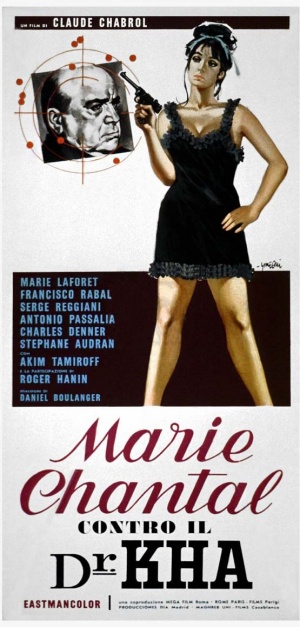★★
“As if Stanley Kubrick had directed a Carry On film.”
 I’d probably better start of by explaining the above tagline, Chabrol was one of the leading lights of the French ‘New Wave’ cinema, alongside the likes of Truffaut and Godard: I’ve enjoyed the films of his I’ve seen, mostly later works such as L’Enfer or La Fille coupée en deux. But in the mid-60’s, he basically sold out, churning out a number of light spy spoofs. Regarding another of his works around this time, he said, “I really wanted to get the full extent of the drivel. They were drivel, so OK, lets get into it up to our necks.” It’s easy to see what he meant, for Marie-Chantal is undeniable drivel, though lacks the necessary enthusiasm to overcome those limitations. Through a chance encounter on a train, the titular heroine (Laforet) is given a piece of jewellery by a stranger. That makes her the target for spies from Russia and America, as she travels from the Alps to Morocco, and also the minions of evil overlord Dr. Kha (Tamiroff), for it holds the secret to a weapon of potential global destruction, that everyone wants to acquire.
I’d probably better start of by explaining the above tagline, Chabrol was one of the leading lights of the French ‘New Wave’ cinema, alongside the likes of Truffaut and Godard: I’ve enjoyed the films of his I’ve seen, mostly later works such as L’Enfer or La Fille coupée en deux. But in the mid-60’s, he basically sold out, churning out a number of light spy spoofs. Regarding another of his works around this time, he said, “I really wanted to get the full extent of the drivel. They were drivel, so OK, lets get into it up to our necks.” It’s easy to see what he meant, for Marie-Chantal is undeniable drivel, though lacks the necessary enthusiasm to overcome those limitations. Through a chance encounter on a train, the titular heroine (Laforet) is given a piece of jewellery by a stranger. That makes her the target for spies from Russia and America, as she travels from the Alps to Morocco, and also the minions of evil overlord Dr. Kha (Tamiroff), for it holds the secret to a weapon of potential global destruction, that everyone wants to acquire.
I was hoping for something along the same lines as Modesty Blaise – preferably the books rather than the wan cinematic adaptation which would appear the following year – but this struggled even to reach the low standards of the latter. Marie-Chantal isn’t as dumb as she appears, but for someone who is supposedly a third Dan in martial-arts, she doesn’t exactly put those skills into practice often. Indeed, there’s only one scene which would even qualify as a fight, and it’s more of the Honey West kind. You just get the feeling that Chabrol is not remotely interested in the action side of the genre, only the tropes. Some of the characters are endearingly quirky, not the least of whom is Kha, who can predict what everyone is going to do – except, of course, the mercurial Marie-Chantal. That’s perhaps because she’s not a secret agent, rather someone who just stumbled into the field by accident [this aspect reminded me somewhat of Robert Scheckley’s The Game of X, which was one of my favourite books as a teenager]; as a result, she doesn’t so much not play by the rules, as simply not know them.
It’s lightly-amusing, with some good photography and a nice 60’s sense of style; between the era and its Frenchness, you won’t be surprised to hear that everyone smokes like chimneys, which seems particularly taboo by modern standards. But there simply isn’t enough going on to make this more than marginally entertaining, and the Italian poster image on the right is an early example of false advertising. The ending leaves it open to a sequel which never materialized, so it seems that even the audience of the time were less than impressed, and it can’t be said to have improved with age. Still, commercial cinema’s loss is la nouvelle vague’s gain, I suppose.
Dir: Claude Chabrol
Star: Marie Laforet, Francisco Rabal, Serge Reggiani, Akim Tamiroff




